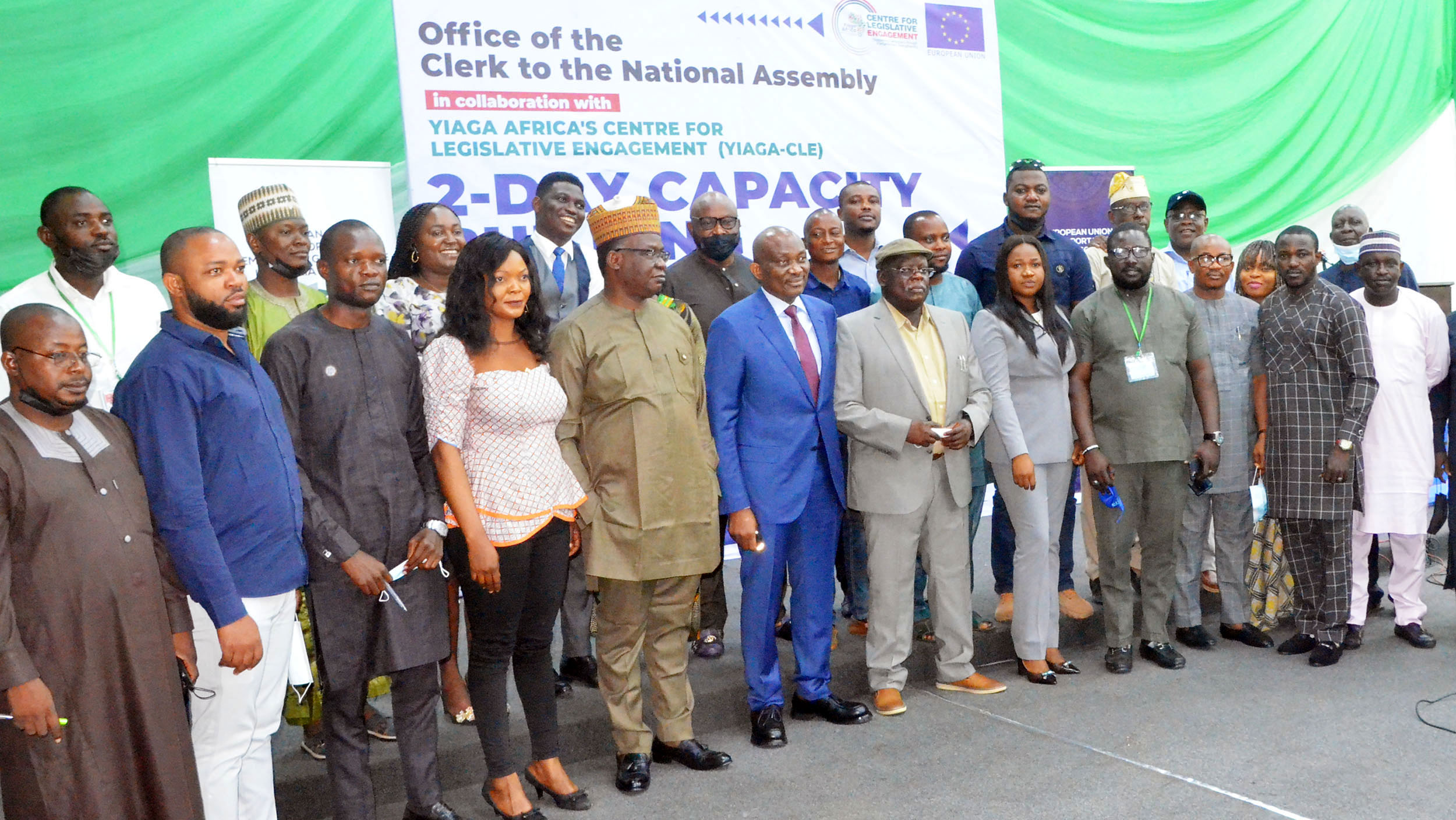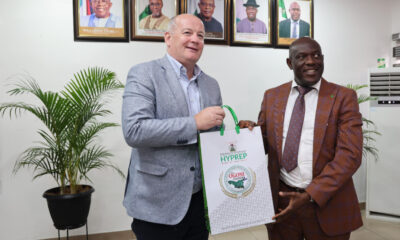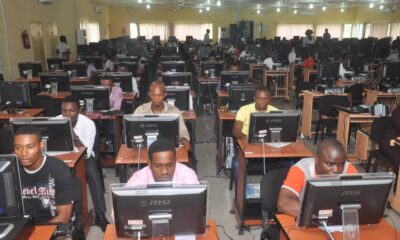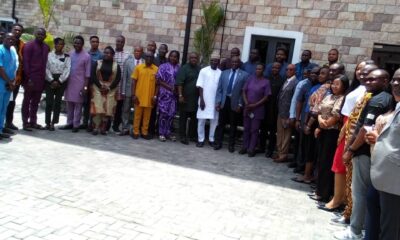Featured
Strike: Redirect Presidency, NASS Budgets, Others To Meet ASUU’s Demands, SERAP Tells Buhari

The strike which has lasted more than 130 days jeopardising the future of Nigerian students also caught the attention of the organised labour threatening protest.
The Nigeria Labour Congress (NLC), had last Thursday, said it would embark on a one-day protest to force the Federal Government respond to ASUU demands.
Socio-Economic Rights and Accountability Project (SERAP) has, therefore, urged President Muhammadu Buhari to “urgently recover missing N105.7billion of public funds from ministries, departments and agencies (MDAs) to fund the country’s public tertiary institutions, improve the welfare of staff members, and ensure that the striking Academic Staff Union of Universities (ASUU) return to class without further delay.”
SERAP said, “Pending the recovery of the missing public funds, we urge you to redirect some of the presidency’s budget of N3.6billion on feeding and travels, and the N134billion allocated to the National Assembly in the 2022 budget to meet the demands by ASUU.”
SERAP also urged him to “send to the National Assembly a fresh supplementary appropriation bill, which reflects the proposed redirected budget, for its approval.
In the letter dated July 2, 2022, and signed by SERAP Deputy Director, Kolawole Oluwadare, the organisation said: “Meeting the demands by ASUU would confront the persistent and widening inequality in educational opportunity, and promote equal protection for poor Nigerian children.”
According to SERAP, “The apparent failure by your government to agree with the reasonable demands by ASUU, implement the good faith agreement with the union and to satisfactorily resolve the issues has kept poor Nigerian children at home while the children of the country’s politicians attend private schools.”
The ASUU accused the government of poor commitment to the payment of academic earned allowance (EAA); poor funding, the continued use of the Integrated Personnel Payroll Information System (IPPIS) and refusal to adopt the Universities Transparency and Accountability Solution (UTAS), among others.
SERAP said, “Meeting ASUU demands would also ensure protection against the harms of discrimination and educational deprivation.”
The letter, read in part: “The poor treatment of Nigerian children in the country’s public tertiary institutions is inconsistent and incompatible with the Nigerian Constitution and the country’s international human rights obligations.
“Widening inequalities in the area of education bear all the more dramatic consequences given the importance of education, as an empowering right, in giving the possibility to all to explore and realise their potential.
“Inequalities in education have a rolling effect, leading to even more and continued inequalities in the future.
“Apart from being a right in itself, the right to education is also an enabling right. Education creates the ‘voice’ through which rights can be claimed and protected, and without education people lack the capacity to achieve valuable functioning as part of the living.
“If people have access to education they can develop the skills, capacity and confidence to secure other rights. Education gives people the ability to access information detailing the range of rights that they hold, and government’s obligations.
“We would be grateful if the recommended measures are taken within seven days of the receipt and/or publication of this letter. If we have not heard from you by then, SERAP shall take all appropriate legal actions to compel your government to comply with our request in the public interest.
“Recovering the missing N105.7billion of public funds and redirecting the funds, as well as some parts of the presidency and National Assembly budgets to meet the demands by ASUU would end the protracted negotiations between ASUU and the Federal Government and improve access of poor children to education.
“Recovering the missing N105.7billion of public funds and redirecting the funds, as well as some parts of the presidency and National Assembly budgets to meet the demands by ASUU would also be in the public interest.
“The proposed spending of taxpayers’ and public funds would also be consistent with constitutional responsibilities and oath of office by public officers, as well as comply with Chapter 2 of the Nigerian Constitution relating to fundamental objectives and directive principles of state policy.
“Recovering the missing N105.7billion of public funds and redirecting the funds, as well as some parts of the presidency and National Assembly would be entirely consistent with your constitutional oath of office, and with the letter and spirit of the Nigerian Constitution, as it would promote equal opportunities for poor children who rely on public schools and have no opportunity for university education elsewhere.
“SERAP is concerned that Nigeria’s public tertiary institutions have continued to experience a steady decline. The quality of public education offered is low and standards have continued to drop. The learning environment does not promote effective learning.
“Public school facilities are in a state of extreme disrepair, requiring major rehabilitation. Basic teaching and learning resources are generally not available, leaving many lecturers and other staff members profoundly demoralised.
“The failure to end the ASUU strike has hugely contributed to denying poor Nigerian children access to quality education, opportunities and development. The enjoyment of the right to education for millions of poor children remains a distant goal.
“Under international law, states are required to progressively implement socio-economic rights, including the right to quality education commensurate with the level of resources available. Gross misallocation of resources to the detriment of the enjoyment of the right to quality education can constitute a human rights violation.
“A violation of the right to education will occur when there is insufficient expenditure or misallocation of public resources which results in the non-enjoyment of access to education by poor Nigerian children.
“The failure to meet the reasonable demands by ASUU cannot be justified especially given the failure and/or refusal by the Federal Government to recover trillions of Naira reportedly missing in ministries, departments and agencies, and the huge funds allocated to the presidency and the National Assembly in the 2022 budget.
“According to our information, N105.7billion of public funds are missing, as documented by the Auditor-General of the Federation in his annual audited report for 2018. Also, while the presidency has budgeted N3.6billion for feeding and travels, N134billion has been allocated to the National Assembly in the 2022 budget.
“Furthermore, ASUU and other university workers’ unions have been on strike for several months. The unions’ demands, among other things, include better funding for the nation’s public tertiary institutions and improved welfare for their members.
“While your government has reportedly released N34billion for the payment of minimum wage consequential adjustments from 2019, ASUU has maintained that until its core demands are met, it will not suspend the strike.
“In protest of the continuous use of IPPIS and refusal by the Federal Government to implement the renegotiated 2009 agreement that was completed in May, 2021, ASUU resumed nationwide strike on February 14.”
Featured
RSG Commits To Workers’ Welfare …. Calls For Sustained Govt, Labour Partnership

The Administrator of Rivers State, Retired Vice Admiral Ibok-Ete Ekwe Ibas, has assured the commitment of Rivers State government to workers’s welfare and industrial harmony in Rivers State.
The Sole Administrator gave the assurance after meeting with leadership of organized labour unions at the Government House, Port Harcourt on Wednesday.
Ibas reaffirmed government’s policy of prompt payment of salaries and pensions to workers and retirees, stating that all local government employees are not receiving the approved minimum wage.
He disclosed that approval has been given for payment of newly employed staff at Rivers State University Teaching Hospital and the Judiciary, while medical workers in Local Government Areas will now receive correct wages.
Ibas explained that, Government is reviewing implementation challenges of the Contributory Pension Scheme ahead of the July 2025 deadline, adding that Intervention buses have been reintroduced to ease workers’ transportation ,with plans to expand the fleet.
He said specialized leadership training for top civil servants will commence within two weeks, while due consideration is being given to implementing the N32,000 consequential adjustment for pensioners and clearing outstanding gratuities.
Ibas commended Rivers State workers for their dedication to service and called for sustained partnership with labour unions to maintain industrial peace.
“This administration recognizes workers as critical partners in development. We remain committed to addressing your legitimate concerns within available resources,” he stated.
The State NLC Chairman, Comrade Alex Agwanwor, thanked the Administrator for the steps taken so far with regard to workers welfare while appreciating his disposition towards alleviating the transportation problem faced by workers.
He also expressed appreciation for the government’s openness to dialogue and pledged continued cooperation towards achieving mutual goals.
The Rivers State Government assured all workers of its unwavering commitment to their welfare and called for continued dedication to service delivery for the collective progress of our dear State.
Featured
Labour Unions In Rivers Call For Improved Standard Living For Workers

The Nigeria Labour Congress (NLC), Rivers Council, has called for policies that will improve the economic situation of the country in order to ensure enhanced living standard for workers.
The State Chairman, Mr Alex Agwanwor, made the remark on behalf of the unions affiliated to Labour Congress during the 2025 workers day celebration in Port Harcourt, yesterday.
Agwanwor highlighted the demands of the Unions which included the immediate payment of pension arrears, implementation of the N32,000 minimum wage for pensioners, and payment of gratuities and death benefits without further delay.
“We are calling for the regulation and protection of e-hailing drivers, implementation of increments and promotions, and resolution of long-standing issues in the polytechnic sector,” he said.
Agwanwor on behalf of the unions appealed to President Bola Tinubu to reinstate the democratically elected Governor, Deputy Governor, and members of the Rivers State House of Assembly.
He stressed the importance of democratic governance and good working relationship with elected representatives.
According to him, the unions expressed disappointment over the imposition of taxes, increase in electricity tariff, and high cost of goods and services, which have further worsened the plight of workers.
“We urge the federal government to take measures to alleviate the suffering of citizens,” he said.
Featured
Tinubu committed to unlocking Nigeria’s potential – Shettima

Vice-President Kashim Shettima says President Bola Tinubu is committed to unlocking Nigeria’s full potential and position the country as a leading force on the African continent.
Shettima stated this when he hosted a delegation from the Hertie School of Governance, Berlin, led by its Senior Fellow, Dr Rolf Alter, at the Presidential Villa in Abuja last Wednesday.
He said Nigeria was actively seeking expertise from the global best institutions to enhance policy formulation and implementation, particularly in human capital development.
The Vice-President noted that President Tinubu was determined to elevate Nigeria to its rightful position as a leading force in Africa.
“The current crop of leadership in Nigeria under President Bola Ahmed Tinubu is ready and willing to unleash the full potential of the Nigerian nation on the African continent.
” We are laying the groundwork through strategic reforms, and at the heart of it, is human capital development.”
He described the Hertie School as a valuable partner in the journey.
According to him, Hertie School of Governance, Berlin, has track record and institutional knowledge to add value to our policy formulation and delivery, especially in this disruptive age.
Shettima reiterated the government’s priority on upskilling Nigerians, saying ” skills are very important, and with our Human Capital Development (HCD) 2.0 programme.
“We are in a position to unleash the full potential of the Nigerian people by enhancing their capital skills.”
The Vice-President acknowledged the vital support of international development partners in that effort.
” I want to thank the World Bank, the European Union, the Bill and Melinda Gates Foundation, and all our partners in that drive to add value to the Nigerian nation,” he maintained.
The Vice-President said human capital development was both an economic imperative and a social necessity.
Shettima assured the delegation of the government’s readiness to deepen cooperation.
” We need the skills and the capacity from your school. The world is now knowledge-driven.
“I wish to implore you to have a very warm and robust partnership with the government and people of Nigeria.”
Shettima further explained recent economic decisions of the government, including fuel subsidy removal and foreign exchange reforms.
“The removal of fuel subsidy, the unification of the exchange rate regime and the revolution in the energy sector are all painful processes, but at the end of the day, the Nigerian people will laugh last.
“President Tinubu is a very modern leader who is willing to take far-reaching, courageous decisions to reposition the Nigerian economy,” he added.
Earlier, Alter, congratulated the Tinubu administration for the successful launch and implementation of the Human Capital Development (HCD) strategy.
The group leader described the development as ambitious and targeted towards the improvement of the lives of the citizens.
He expressed satisfaction with the outcome of his engagements since arriving in the country.
He applauded the zeal, commitment, energy and goodwill observed among stakeholders in the implementation of Nigeria’s HCD programme.
Alter said the Hertie School of Governance would work closely with authorities in Nigeria across different levels to deliver programmes specifically designed to address the unique needs of the country.
He, however, stressed the need for government officials at different levels to be agile and amenable to the dynamics of the evolving world, particularly as Nigeria attempted to successfully accelerate its human capital development aspirations.
-

 Politics5 days ago
Politics5 days agoHe Is God’s Gift To Nigeria, Arthur Eze Says Ahead Tinubu’s Second Year In Office
-
Nation5 days ago
NIWA Sensitises Water Users On Safety Protocols In Niger, Kwara
-
Nation5 days ago
He Is God’s Gift To Nigeria, Arthur Eze Says Ahead Tinubu’s Second Year In Office
-

 Politics5 days ago
Politics5 days agoPDP Crisis: Wike Accuses Makinde Of Betrayal, Instigating Party Members Against Him
-
Nation5 days ago
NIMASA Partners Police Against Maritime Crimes
-

 Oil & Energy5 days ago
Oil & Energy5 days agoAdministrator Assures Community Of Improved Power Supply
-
Nation5 days ago
PDP Crisis: Wike Accuses Makinde Of Betrayal, Instigating Party Members Against Him
-
Rivers5 days ago
NAFDAC Uncovers Evangelism Group Involved In Fake Drug Distribution











